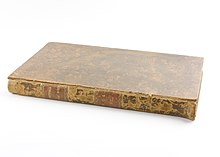General Stud Book
The General Stud Book (GSB) is the ancestral record of English thoroughbreds in the form of registers distributed over several books.
history
The General Stud Book was first published in 1793 by James Weatherby after he had published a preliminary book to it in 1791. The reason for these publications was the confusing breeding and racing situation in England in the 18th century, so that the Jockey Club, founded around 1751, gave the order to summarize the scattered data on breeding results in a single register. The first edition contained the names and dates of around 5500 horses. In the following years the Stud Book was expanded and corrected step by step and was finally available in full in 1808. The ancestry of the horses listed in it had been traced back as far as possible.
regulate
Around 1800 the breeders in England realized that another crossing of oriental horses brought no improvement and the book was closed. Now only the offspring of already registered mares and stallions were accepted into the GSB (so-called "pure breeding"). At this point in time the name "Thoroughbred" for the newly created breed was also created. The word means "carefully bred". However, the principle of the closed stud book also brought problems, because about 100 years after its creation, some English thoroughbreds re-imported from America (including Durbar II ) could not be registered. The descent of Lexington , the grandfather of Durbar II , could not be fully clarified, so that many of his descendants could not be registered.
additions
When in 1948 two classic races in England were won by horses ( My Babu and Black Tarquin ), which according to the strict registration rules were not to be regarded as pure English thoroughbred horses, the rules of 1913 (so-called »Jersey Act«) were relaxed: From now on In addition, registrable horses had to have eight generations of pure blood (approx. 100 years) and they had to have achieved racing performances that could only be traced back to the purity of their blood.
International books
Ancestral records analogous to the English GSB are now kept in all countries in which the English thoroughbred horse is bred (e.g. with the "ADGB" - General German Stud Book - in Germany by the Directorate for Thoroughbred Breeding and Races , Cologne). Through an international agreement from the 1970s, the thoroughbred breeders 'associations in most countries recognized the stud book entries of the thoroughbred breeders' associations in other countries, thus settling the dispute over uncertain pedigrees that arose as a result of the Second World War (so-called "prey horses") and a problem-free international one Trade in English thoroughbreds was made possible.
